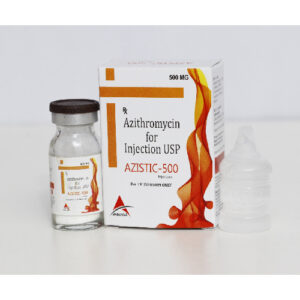Description
Piperacillin and Tazobactam Injection comes with the branding “AZOPIP 4.5” and It is a drug class belonging to ‘Antibiotics’, and its primary application is treating bacterial infections. It is applied for the treatment of numerous hospital-acquired and ventilator-associated pneumonia, urinary tract infections, intra-abdominal infections, skin and soft tissue infections (such as diabetic foot infection) and uterine infections. Bacterial infection results when the harmful bacteria multiply in the body and lead to illness. Bacterial infection can infect any body part and reproduce very rapidly.
Piperacillin and Tazobactam Injection is a combination of two drugs, i.e., Piperacillin (Penicillin antibiotic) and Tazobactam (beta-lactamase inhibitor). Piperacillin is a member of the ‘Penicillin antibiotics’ class. It exhibits bactericidal (bacteria-killing) activity against gram-positive and gram-negative aerobic (needing oxygen to grow) and anaerobic (grows with minimal or no oxygen) bacteria. Piperacillin kills by binding to the penicillin-binding proteins (PBPs) within the bacterial cell wall and stopping its cell wall synthesis.
Tazobactam is an inhibitor of beta-lactamases. Beta-lactamases are the enzymes that bacteria secrete in order to become multi-resistant to β-lactam antibiotics, including penicillins and cephalosporins. Tazobactam inhibits the degradation of other antibiotics by bacteria that produce beta-lactamase enzyme. Therefore, this drug acts by inhibiting bacteria from destroying Piperacillin.
Uses of Piperacillin and Tazobactam Injection
- Intra-Abdominal Infection Treatment: This medication treats severe intra-abdominal infections by targeting bacteria that infect it.
- Respiratory Tract Infections: It is employed to cure dangerous respiratory infections, such as pneumonia.
- Skin and Soft Tissue Infections:Assists in curing complicated skin and soft tissue infections, such as those caused by surgical wounds, bites, or diabetic foot infections.
- Urinary tract infections: It is also employed to cure urinary tract infections, assisting in getting rid of the bacteria that lead to these infections.
- Gynecological Infections: It treats serious infections in females, such as pelvic inflammatory disease and endometritis, by acting against a wide range of bacteria.
Medical Benefits
- Piperacillin is a Penicillin-type antibiotic. It binds to the penicillin-binding proteins (PBPs) within the bacterial cell wall and prevents its cell wall synthesis.
- Tazobactam is a beta-lactamase inhibitor that inhibits the degradation of other antibiotics by beta-lactamase enzyme-producing organisms.
- It works by stopping bacteria from breaking Piperacillin. Therefore, this drug does treat many bacterial infections of the stomach, lungs, skin and uterus.
Directions for Use
- This should be given only by a health care giver.
- It is regularly given intramuscularly (in the muscle) or as prescribed by the doctor.
- Self-medicate or adjust dose without medical advice.
- Finish the entire course as instructed for the best effect.
Storage
- Store the medicine in a dry, cold place away from direct sunlight.
- Keep the medicine below 25°C (77°F).
- Do not freeze this Methylcobalamin + Pyridoxine HCL + Nicotinamide + Benzyl Alcohol Injection.
- Keep out of the reach of children and pets.
Precautions
- It can interact with anticoagulants (heparin), anti-cancer medication (methotrexate), antibiotics (tobramycin, vancomycin), gout drugs (probenecid), and anaesthetic medications (vecuronium).
- Steer clear of alcoholic beverages while on Piperacillin+tazobactam to avoid nauseating side effects. Inform your doctor prior to administration of it. If you have cystic fibrosis, kidney disease, fits, colitis, bleeding disorders, heart or liver disease, and are on dialysis treatment, inform your doctor. Steer clear of alcoholic beverages while using Piperacillin and Tazobactam Injection to avoid nauseating side effects.
- Pregnant and lactating women must take this composition after consulting a physician.
Side Effects
- Difficulty in sleeping
- Constipation
- Nausea
- Headache
- Diarrhoea
Frequently Asked Questions (FAQs)
Is it safe for individuals with kidney problems?
If you have kidney disease, your physician can change your dose or keep a closer eye on you. Always notify your physician regarding kidney conditions prior to treatment.
Can this injection impair liver function?
Yes, it is very unlikely, but sometimes it can affect liver enzymes. Your doctor will take some blood tests while you are getting treatment to check your liver function.
What if I have an allergic reaction?
If you develop rash, swelling, itching, or breathing difficulties, stop the injection and call a doctor immediately. They may be signs of an allergy.
Can this drug cause loose stools or diarrhoea?
Yes, mild diarrhoea is a frequent side effect. Fluids and a light diet. If diarrhoea is bloody or bad, talk to your doctor.
Can this injection be taken if pregnant or nursing?
Inform your doctor if you are pregnant or nursing. It will be administered only if needed and deemed safe by your doctor.
Does this injection have an impact on the immune system?
It doesn’t directly affect your immune system, but like other antibiotics, overuse may reduce its effectiveness and lead to resistant infections.













